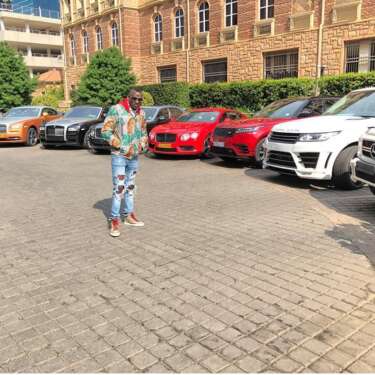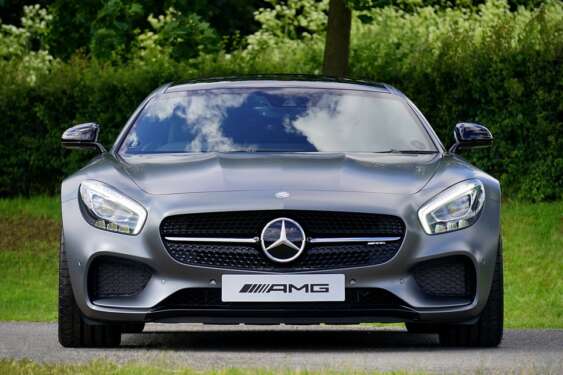A few months ago, Zimbabwe lost a prominent young businessman Genius Kadungure popularly known as Ginimbi. His fame came not from his business endeavors but rather his larger than life lifestyle. In his rural home of Domboshava, he built a mansion that could easily be confused for a hotel. His fleet of cars comprised of several Rolls Royce models, a few Bentley’s, Lamborghini Aventador S Coupe a Ferrari 488 Spider, a few Mercs, and a couple of Range Rover models. He certainly had an affinity for the finer things in life.

He was not alone. In May 2020, South African Thabiso Ndlovu caused a furor on Twitter when he posted a video of 5 luxury vehicles he purchased at one go including three porches, a Jeep, and a Lamborghini Iris SUV.
Kenyan Chris Kirubis is another business mogul who made the headlines on several occasions for his preference for luxury vehicles.
These are just a few examples of the level of luxury appetite that has risen on the continent.
A booming population comprising of a youthful, high achieving class has created the rise of an affluent elite class that craves the finer things in life. As such a market for luxury goods has emerged and continues to grow.
The luxury goods market inclusive of luxury clothing, designer labels, custom made suits and fine dining continues to grow as more and more people join the leagues of the elite.
According to a 2019 AfrAsia Bank report titled Africa wealth report, there are over 140 000 high net worth individuals in Africa all of them millionaires. The report projected a 35 percent growth in individual wealth expected to grow to 3 trillion by 2028. These high net worth individuals account for 42% of the continent’s wealth which amounted to $2.2 trillion.
The growing wealth particularly the individual wealth statistics points to the high potential within the luxury goods market. 2018 figure shows that the luxury goods and services sector such as cars, private jets, luxury clothing market made over $6 billion in revenue. This is set it increase as the growing luxury sector is spurred by a rising elite. Africas largest luxury market by revenue includes South Africa, Egypt, Morocco, Nigeria, and Kenya with several other countries joining in.
The social media economy
For many, it may simply be a means of communication. But it carries an inert potential to power a billion-dollar luxury brands industry.
Social media is an important driver for demand in the luxury market. The fear is missing out and keeping up with the Jones mentality creates an appetite for luxury brands born out of peer pressure or simply the need to impress. The brands thus become a status symbol creating an opportunity for luxury brand sellers to capitalize on this demand.
By appealing to this young demographic via social media, the demand for luxury goods will increase.
A growing upper-middle class will facilitate the growth of this class of buyers. as more people seek to attain a perceived status through luxury goods.
This has seen a rise in influencers and socialites driving luxury products via social media. The growing internet usage, accelerated by the Covi-019 pandemic creates a greater opportunity for African social media space to turn into a hub for luxury products.
Buy Africa?
The high net worth demographic tends to buy foreign goods as opposed to locally manufactured goods. This is in part attributable to foreign luxury brand marketing efforts which tend to be more visible and established.
Another factor that counts against local manufacturers is the inability to scale production. This is in contrast to the economies of scale that luxury brands such a Louis Vuitton or Gucci possess. The advent of the African Continental Free Trade Area may proffer a solution to this problem. By coordinating the activities of “Made in Africa” luxury brands sufficient clout and economies of scale can be achieved that will help to position local brands as strong competitors in the luxury brands market.
The growing band of high net worth individuals means an increasing market for luxury products open to be tapped into.
A cut above the rest
Over 50 percent of the world’s diamonds are mined in Africa. These diamonds find their way into the luxury market. Between the mine and the showroom, the rough diamonds appreciate more than 500% value. Much of this value addition takes place outside of Africa. This means that Africa gets the shorter end of the value benefit.
The growing luxury market presents an opportunity for more business opportunities within the luxury diamond sector to capitalize on value addition opportunities within this sector.
Granted, the sustained demand for high-end diamond products may take time to build sufficient momentum. However, building capacity within this sector will usher in increased opportunities to expand into the global luxury diamond market.
Dressed to kill
Creativity and original style is nothing new in Africa. Using traditional prints and more contemporary fabrics, the luxury market is capturing the growing market’s love for distinction. Across several cities for instance Lagos and South Africa, high profile fashion weeks showcasing the best design talent are held similar to the fashion weeks of Paris and New York. These fashion weeks allow designers to showcase their talent and benefit from more opportunities.
Image Credit: Jason Hargrove
The luxury fashion industry has enormous growth potential. Spurred by the growing upper-middle-class and affluent, it will continue to grow in size and exposure. However, investment and sponsorship is a great hindrance to the success of this market. Through robust marketing and AfCTA integration, the luxury market has the potential to become a substantial economical force to contend with.
Towards a vibrant luxury economy
The changing demographic, rapid urbanization and population growth have created a growing luxury market. This coupled with improving digitization has allowed the ranks of the growing affluent to maintain a vibrant luxury market in Africa. As the prospect of the continent continues to grow in the right direction, the luxury sector is expected to continue on a growth trajectory. Taking advantage of the affinity for the finer things in life presents business opportunities within the luxury market for innovative entrepreneurs.
The potential is there; one example is Satta Matturi fine jewelry house. Owned by a Sierra Leone born lady, the luxury jewelry house makes African themes designer jewelry and boasts of clients like American star Rihanna.
Indeed, luxury brands in Africa have scope for growth that can be harnessed towards a vibrant luxury economy, Agenda 2063, and beyond.
Read also: Scottish premium whisky Macallan plans to dominate luxury segment in Africa




